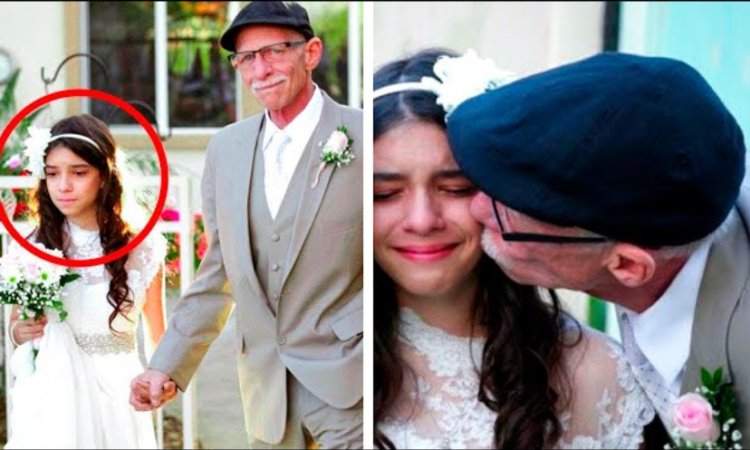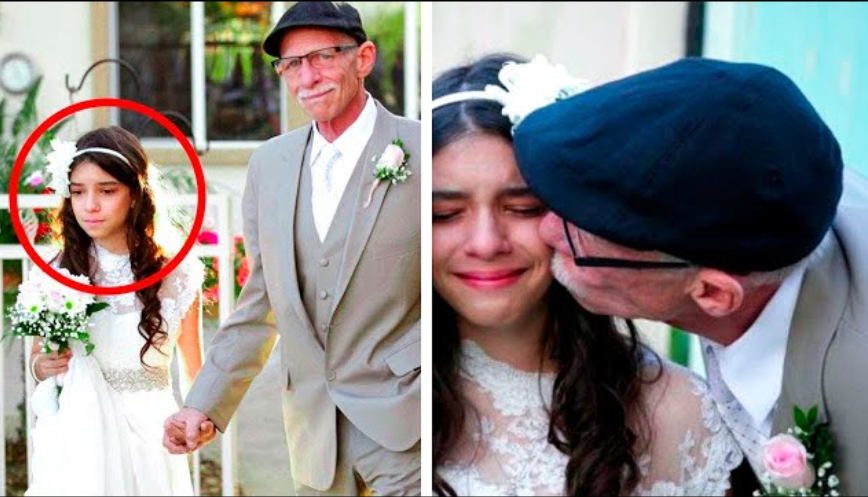Young Woman Cried When She Married The Old Man, But Her Secret Was Revealed During The Wedding Night

A young woman is forced to marry an 83-year-old man and could never have imagined what would happen on her first wedding night. She is shocked when her new husband reveals a secret. The faint light of dusk bathed the village in golden colors, giving a solemn air to the ceremony that was taking place under the indifferent gaze of nature.

At the heart of the clearing, a tribal altar adorned with torches that crackled and cast dancing shadows over the figures present stood as a sacred place where the pact was to be sealed. It was a wedding, however different from what it should have been because it was devoid of joy and celebration on the part of the bride, Isabella, an 18-year-old woman dressed in simple tribal clothes typical of the culture. She shivered not from the cold but from a deep fear that gripped her heart.
“Mom, Dad, please don’t let me marry him,” she begged, her voice laced with despair and her eyes flooded with tears. Her parents, with stern expressions, showed no compassion. “You will marry him, do you hear that? The old man paid for you, so now you’re his problem,” said the father, with a coldness that cut through her soul. The girl cried bitterly, the pain of rejection crushing her heart.
How dare you sell your own daughter?” she shouted, her voice filled with disbelief and sadness. “You are not our daughter,” they shouted, “and you’ll be fine. You’ve always loved living in the middle of the woods, working with these people anyway.” They were referring to the fact that the young woman had started her nursing course, always doing volunteer missions in remote villages and tribes. “Just hurry,” said the mother impatiently, walking up to the makeshift altar surrounded by torches and the curious gazes of those gathered.
Isabella found herself face to face with her fiancé, an 83-year-old man who was watching her with a look she couldn’t decipher. Her heart sank even more at the thought of the future that awaited her. The man in charge of the ceremony, a respected elder of the tribe, pronounced the words that declared them husband and wife, sealing the young woman’s fate with the authority of his voice. There was no love, no consent, just the fulfillment of an agreement.
“Your things are already in the hut, girl. You live here now,” said her parents, saying goodbye with words that sounded like a final farewell. “Don’t you ever come home. We don’t want to see you again. You’re this old man’s problem now,” added the father, sealing his daughter’s fate with unbridled cruelty.
Alone, watching her parents’ car drive away, the young woman felt the weight of the world on her shoulders. Tears flowed freely down her face as she followed the man who was now her husband to the hut that would be their new home, where they would spend their first wedding night. But as she entered her new home, something unexpected awaited her. Her eyes, still blurred by tears, widened as she witnessed what fate had in store for her.
But the question that remains unanswered is how and why did that girl end up marrying an 83-year-old from a remote tribe? Let’s go back in time a little to explain it better.
In the vibrant heart of a renowned university, 18-year-old Isabella was bursting with enthusiasm. She had just started her nursing course, a giant step towards her dream of helping others. The campus was full of hurrying students and animated conversations, but for the girl, nothing was more exciting than the trip to a remote tribe that they had been planning. This expedition, part of the university’s charity project, promised to be the perfect opportunity to apply their newly acquired knowledge in a real and meaningful context.
“I can’t believe we’ll finally get to do everything we’ve been learning so far,” she exclaimed to her friend as they packed the last items into the donation box. Clothes, medicines, even children’s books. “I hope this makes a real difference to them,” her friend smiled, sharing her excitement. “I know, right? And who knows, maybe we’ll meet some local hotties while we’re there,” she said, joking.
“My God, Anna, that’s all you think about. And you talk as if they were natives who have never seen anyone. They’re normal people, you know, they just live somewhere far away,” the young woman said.
The journey to the tribe was a mixture of excitement and admiration. When they arrived, the raw, untouched beauty of the surrounding nature left Isabella breathless. But what really captured her attention was the warm welcome from the locals, whose sincere smiles and curious glances made her feel immediately welcome. She enjoyed being a nurse and serving the people, and just like her friend had commented, she actually met an attractive young man who caught her eye.
It was during her work in the tribe that Isabella met Nati. He was a young warrior of only 21 years old, whose presence seemed to dominate his surroundings. His lean body adorned with paintings that told stories of courage and struggle moved with a grace that defied his fierce appearance. Nati was a born leader, always willing to help and teach the young how to take care of the tribe. They didn’t fight other tribes, but he was responsible for training the younger so that the tribe would always be safe.
One day, while Isabella was helping with medical triage, Niti approached with a deep cut on his arm. “I was repairing one of the huts when it happened,” he explained, his calm tone contrasting the deep wound. As the student tended to his arm, their eyes met. There was an intensity in that young man’s gaze that took her breath away, an instant connection that seemed to transcend words. The moment was brief but charged with an energy that Isabella had never experienced before. She felt her heartbeat faster, her skin shivered when their eyes met.
As she finished bandaging Nati’s arm, they both knew that something special had just happened between them, something that neither of them was prepared to define yet but which they intuitively recognized as significant.
As the days turned into weeks and the weeks into months, the connection between Isabella and Nati blossomed, defying the vast cultural differences that separated them. The young warrior kept his promise, visiting her in the city several times, meeting secretly whenever they could. They explored the hidden corners of the city, shared laughs under the starry sky, and talked about dreams for the future, dreams that increasingly included each other. Isabella had never felt so alive, so loved. The young man showed her a world of affection and understanding that she would never have imagined possible.
However, not everyone saw this blossoming love in a good light. On a seemingly ordinary day, after saying goodbye to Nati early to return home, Isabella found herself in the middle of a storm she hadn’t expected. When her parents, always critical and distant, found out about their romance, they went beyond the limits of indifference to openly express their disapproval.
“You spend all your time with that boy. Do you really think you’re going to be with an idiot native? You’re already a disgrace to us. And to make matters worse, we have to pay for your college, which is nothing but a waste of our money,” scolded her father, his voice full of disdain. Her mother,
equally harsh, added, “You’ve always been a nuisance, girl. That ridiculous sister of mine had to cause me trouble even after she was dead.”
Those words cut the girl deeply, revealing the sad truth about her life. She was not the biological daughter of those she called her parents, but she was the daughter of a sister who died in childbirth. They had always made clear their constant feeling of rejection. The couple had never loved her like a real daughter. The poor thing grew up longing for an affection that was never granted to her, endlessly seeking approval that always seemed out of reach. Isabella took refuge in her studies and voluntary work, hoping that by becoming a nurse, she could finally do something that would make them see her in a new light, that they would be proud of her.
But in that moment, faced with the bitterness of their words, she realized that she might never win the love and respect she so desperately wanted from those who were supposed to be her safe haven.
The revelation of that night not only opened old wounds but also reinforced the importance of the love that Nati offered her, a pure and unconditional love. As the tears streamed down her face, Isabella clung to the hope that, next to the man she would marry one day, she could finally find the acceptance and affection she had always lacked.
But the poor girl could never have imagined what the universe was planning for her life. The next few events took a completely terrifying turn. That’s because one day, an old man from a remote tribe, one of which the girl had volunteered in, showed up at her door. His name was Takota, and with the authority of someone from afar, the 83-year-old man offered her parents a sum of money to let her marry him. And to make matters worse in the eyes of Isabella’s parents, that amount was worth more than their own daughter.
When the girl heard the news, she expected her parents to have kicked the old man out and rejected his outrageous offer. But that wasn’t the case. Without hesitation, the couple accepted the offer, justifying their decision with contemptuous words.
“She already likes staying with those natives, so let her go and live there and get out of our house,” the young woman felt betrayed in the deepest possible way. She cried, begged for compassion, for mercy, but her pleas weren’t heard. It was clear that there was no room for her in her parents’ home, not now, not ever. And the poor thing wouldn’t even have time to meet Nati to ask for help because the wedding was already taking place the next day.
The next day came, and her heart was heavy. In the tribe, every step towards the altar was like walking into an endless abyss. Beside her, Takota, the 83-year-old man she would be forced to marry, represented the end of all her hopes and dreams. How could she, a young woman full of life and aspirations, accept such a cruel fate? Her nursing school, her passion for helping others, the love she felt for Nati, everything seemed to have been brutally ripped away from her.
Even begging her parents not to, when it was time, the girl said yes, although her words were empty, forced by the situation she found herself in. Tears flowed freely down her face, marking the desolation of her spirit. She couldn’t believe that she would spend the rest of her life there, in that remote tribe, far from everything and everyone she loved.
The ceremony ended, and the old man called her into the hut that would be the setting for her wedding night.Come on, dear, you’re in for a long night,” and gently pulled her by the arm. Isabella, resigned and hopeless, followed him, dragging her feet, unable to see beyond the darkness that seemed to have taken over her life.
However, on entering the hut, the nursing student came across something completely unexpected. Her eyes, still clouded by tears, took a moment to adjust to the soft light illuminating the interior. What she saw before her was something she could never have imagined, something that defied all her expectations and fears about that night. That gentleman’s great secret would be revealed at that moment, and everything she thought she knew about her destiny was wrong.
As she entered her new home, Isabella was not met by the dark fate she had imagined, but by the familiar and beloved face of her Nati. Her heart, once weighed down by sadness, now beat fast, confused but filled with sudden hope.
“Nati, what are you doing here?” her voice was a trembling whisper, mixed with surprise and relief. With a smile that carried all the love and affection in the world, the boy approached her, taking her hands in his. “My love, this gentleman is my father, Takota, the head of our tribe. And I… I’m the real groom. Thank you, father, for bringing my wife to me,” the young man’s words seemed to dance in the wind, bringing with them the revelation that would change everything.
Isabella listened in disbelief as he explained the situation. The young man knew well the difficulties his beloved faced with her parents, the lack of love and understanding in her life. She always told him how welcomed and loved she felt whenever she visited the tribe, as if she had found the family there that she never had at home. She also told him that she had heard her parents planning to abandon her in the middle of the night.
Moved by the deep love they felt for each other and the desire to protect her, Nati shared the fact with his father, Takota, that he wanted to marry the girl. However, there was a tradition in the tribe. It was the father who symbolically married his son’s fiancée and then gave her to him as a blessing, a formality that reinforced family ties and the integration of the new member into the family.
The old man, understanding Isabella’s precarious situation with her parents and knowing that they would never agree to give up their daughter voluntarily, decided to offer a payment. Unsurprisingly, her callous parents happily accepted, exposing their lack of character and love for her. The ceremony, therefore, was nothing more than a ritual, a means of honoring the tradition and culture of the village, while at the same time ensuring that Isabella and Nati could be together. The chief of the tribe was there not as Isabella’s husband, but as a link that would unite the two young people according to the customs of his people.
When she understood all this, the girl couldn’t hold back her tears, but now they were tears of pure happiness. She was married to Nati, the man she loved. The relief and joy she felt were immeasurable. The tribe, aware of the true nature of the marriage, celebrated with them, welcoming Isabella as one of their own. “Long live the happy couple!” they shouted, to the sound of music and singing.
That night, the hut witnessed not a farewell to a young girl’s dreams, but the celebration of true love and union according to tradition. And the heart Isabella and Nati, finally together, could begin a new journey, lulled by the blessing of Takota, the village chief, and the warm welcome of their new family. From that day on, the girl’s life was transformed in ways she could never have imagined, finding herself in Nati’s arms, knowing that they were united not only by love but also by the acceptance and respect of an entire community, brought her a feeling of completeness and happiness that she had never experienced before.
Her new life in the tribe was filled with love, not only from the wonderful husband that the warrior proved to be, but also from the people around her who welcomed her as one of their own. Isabella didn’t let the circumstances of her marriage keep her from her personal ambitions, and her husband supported her in everything. She continued her nursing education, dedicating herself even more fervently, knowing now that she had a clear purpose.
The tribe not only supported her studies but also celebrated her success. When she finally completed her training, Isabella became the tribe’s official nurse, a position that allowed her to care for those who had welcomed her so warmly. She applied her knowledge to improve the health and well-being of her new family, introducing modern hygiene practices and medical treatments, which combined with the traditional knowledge of the tribe, worked real miracles. She also ventured to other tribes with the help of her beloved warrior, so that she could bring her passion for nursing and caring to others.
Isabella’s fellow students, impressed and inspired by her journey, often visited her in the tribe, bringing with them new knowledge, medical supplies, and a bridge between two worlds that, thanks to Isabella, were learning to coexist in harmony. These visits were moments of joy and exchange, further strengthening the bond between the young woman and her old life, without her feeling the need to choose one world over the other.
As for the parents who had sold her, Isabella never saw them again. Over time, she realized that she had never had parents in the true meaning of the word. The pain of rejection and betrayal gave way to the acceptance that her real family was the one we chose, not necessarily the one we were born into. In many ways, Isabella became a daughter to Takota, the village chief, and his wife, a sister to the members of the tribe, and a healer respected by all. She had never been happier than in that place, truly finding herself among people who valued her for who she was.
And in the end, Isabella not only found a new home, but also herself, a strong woman loved and able to make a difference in the world around her.




